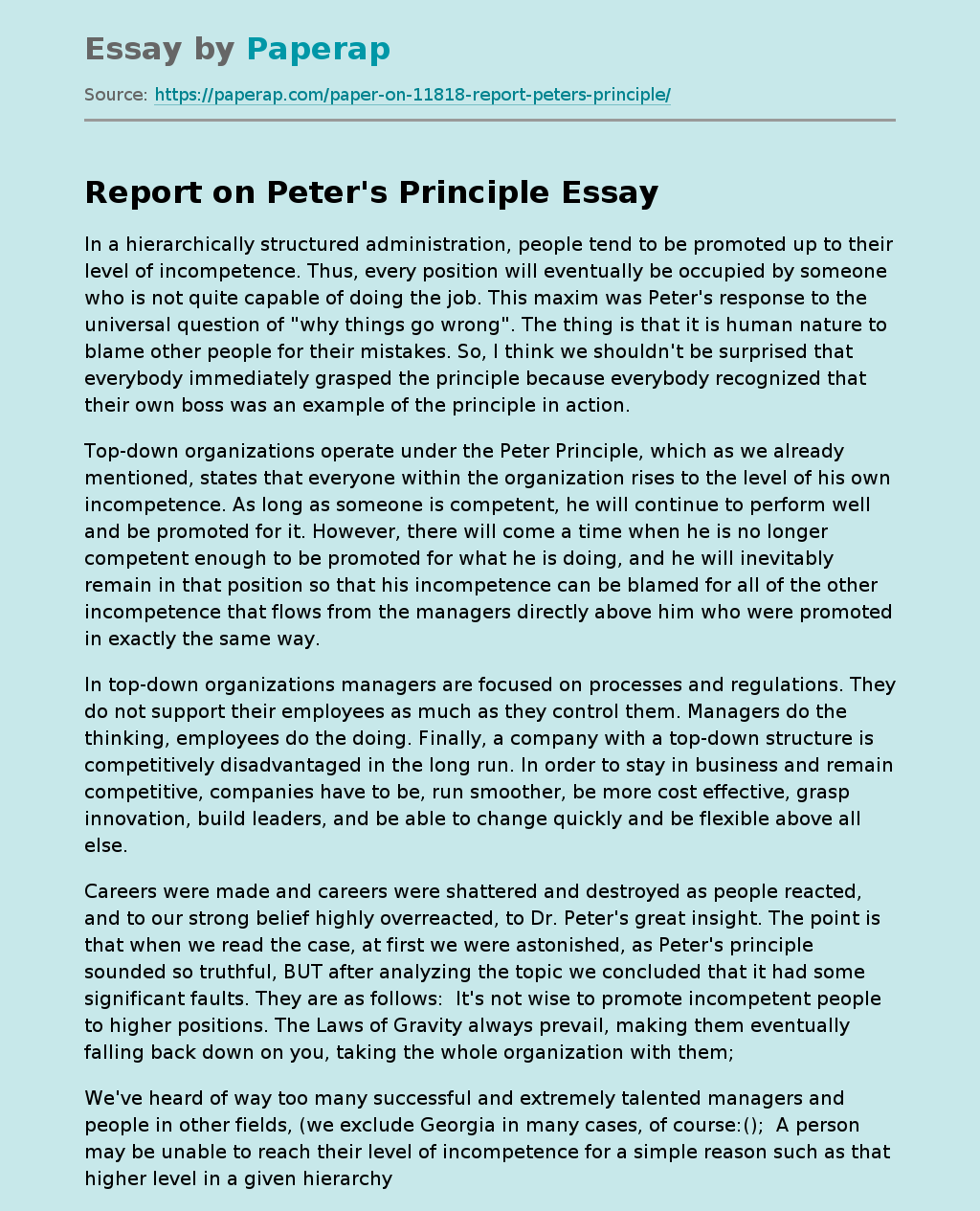Report on Peter's Principle
In a hierarchically structured administration, people tend to be promoted up to their level of incompetence. Thus, every position will eventually be occupied by someone who is not quite capable of doing the job. This maxim was Peter’s response to the universal question of “why things go wrong”. The thing is that it is human nature to blame other people for their mistakes. So, I think we shouldn’t be surprised that everybody immediately grasped the principle because everybody recognized that their own boss was an example of the principle in action.
Top-down organizations operate under the Peter Principle, which as we already mentioned, states that everyone within the organization rises to the level of his own incompetence. As long as someone is competent, he will continue to perform well and be promoted for it. However, there will come a time when he is no longer competent enough to be promoted for what he is doing, and he will inevitably remain in that position so that his incompetence can be blamed for all of the other incompetence that flows from the managers directly above him who were promoted in exactly the same way.
In top-down organizations managers are focused on processes and regulations. They do not support their employees as much as they control them. Managers do the thinking, employees do the doing. Finally, a company with a top-down structure is competitively disadvantaged in the long run. In order to stay in business and remain competitive, companies have to be, run smoother, be more cost effective, grasp innovation, build leaders, and be able to change quickly and be flexible above all else.
Careers were made and careers were shattered and destroyed as people reacted, and to our strong belief highly overreacted, to Dr. Peter’s great insight. The point is that when we read the case, at first we were astonished, as Peter’s principle sounded so truthful, BUT after analyzing the topic we concluded that it had some significant faults. They are as follows: It’s not wise to promote incompetent people to higher positions. The Laws of Gravity always prevail, making them eventually falling back down on you, taking the whole organization with them;
We’ve heard of way too many successful and extremely talented managers and people in other fields, (we exclude Georgia in many cases, of course:(); A person may be unable to reach their level of incompetence for a simple reason such as that higher level in a given hierarchy simply doesn’t exist; Peter suggests that every person is motivated and wishing to get promoted, but all of us have heard of people “stuck” on their jobs.
It’s just that some prefer to stay in their places; because they might love the job they’re assigned to, or hysterically afraid to get a promotion, as they have low self-esteem and underestimate their capabilities which results in fearing new position and/or being unable to fulfill the high expectations, or a person can in fact know for real he is not fit for the suggested position. Unfortunately, the more afraid a person is, the worse his/her mistakes are, and the more closely that someone has to be watched over, and the less we justify “forcing” the person to accept the so called “irresistible” offer!
To avoid the “feared and undesirable” promotion people start simulating incompetence. We think in the case it is very well described and don’t consider necessary to deepen the issue. Instead we want to emphasize your attention on the following: To get promotion being competent on existing position is not enough, as there are numerous strong obstacles that prevent a person’s “going up” in the organization’s hierarchy. For one thing let’s take our country for example. To get promotion in Georgia you need the help of a so called “strong hand”, as at least 80% of workers get promoted thanks to their relatives and/or close acquaintances.
Now let’s try to analyze Peter’s Principle from managers’ point of view. What can be said is what we already mentioned: It is highly unwise to promote people to their own level of incompetence. Why? We think the answer is obvious, if you want your organization to stay in business you MUST have very smart and competent employees, and that’s what we have in reality. Managers do try to have competent people do the job, and so far, thank God, they successfully handle it most of the time.
We should not forget that people need to be treated with respect, knowing that their input matters and their ideas can change how things are done. They need to know that someone is proud of them for doing their jobs well. Everyone is an expert at something. And we emphasize the importance of the previous sentence. It was all we wanted to share with you at this point and we can only wish and hope we made our ideas clear as crystal and they are acceptable, as the topic contained immense opportunities and unfortunately we couldn’t possibly cover all the angles no matter how much we wanted to.
Report on Peter's Principle. (2017, Dec 31). Retrieved from https://paperap.com/paper-on-11818-report-peters-principle/

